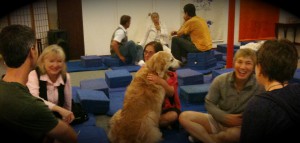Thursday
Dharma TeachingsProtecting Relationships During Don Season
 by Acharya Susan Chapman, Vancouver B.C.
by Acharya Susan Chapman, Vancouver B.C.
Because it was scheduled many months ago, by coincidence last night’s opening class of our Mindful Communication course occurred on the first day of Don Season. Around 40 people, mostly newcomers, listened to the tinkling of the bells from the Mamo chants being conducted in the shrine room next door. This led to an auspicious opportunity, which I felt was an example of the protector principle in action: an abrupt message from the environment that wakes us up and leads to a positive change of course.
I had planned to introduce the class in the usual way — the three intentions of mindful communication training are to gain confidence in openness, the basic goodness of relationship (symbolized by the green light), to become compassionately aware of the blind spots in our conversations that cause harm (red light), and to protect and welcome the vulnerable feelings that arise when we feel groundless and uncertain (yellow light). But because the protector practice was going on next door, I decided to begin with a simple description of what the end of the year Don Season is all about.
“In the last ten days of the old year, we reflect upon the unintentional, sometimes catastrophic consequences of mindlessness. On a large scale, conflicts escalate to feuds and even bloody civil wars. Ignorance and greed lead to pollution of the earth, water and air we rely on, resulting in climate change, famine and plague. At home, on a smaller scale, at the end of the year we try to wake up from this mindlessness and restore the channel of communication with our environment. We invite and welcome the abrupt messages from reality that we normally ignore.”
As I spoke, it became more evident that these two gatherings, the Protector Practice and Mindful Communication class, had much in common. Often the emphasis during Don Season is to clean and de-clutter our physical environment. But what about our relationships? Can we, as a community, expand our understanding of the protector principle to include all the ways we talk and listen to each other?
A Jewish friend once described the importance of ending the year with a period of self-reflection, apology and forgiveness, making every effort to resolve conflicts and unfinished relationship business. In my own relationships as well as in my work as a Marital and Family therapist, I’ve seen the value in clearing the air and making a fresh start. In our homes and communities, communication has the power to damage as well as the power to heal. Protecting and detoxifying the flow of communication in our society is not that different from protecting the watersheds and rivers on our planet.
Traditionally, the Tibetan Buddhist dharmapalas, or protectors, represent a more subtle dimension of the sangha, or community. At an entry level, we take refuge in the buddha, dharma and sangha. And at a more advanced level, the three jewels are represented as the ‘three roots’, the guru, the root of blessing, the yidam, the root of siddhis (or power) and the protector, the root of compassionate, skillful action. What is this compassionate, skillful action? It is communication – feedback from our environment — that interrupts the chain reaction of mindless habit. When we call upon the protectors, we demonstrate our sincerity by showing regret for the harm we’ve done, apologize and request forgiveness. Like any relationship that’s been harmed, the only way to restore trust is through this process of unmasking, making an offering of our vulnerability and simply opening.
At the start of each Don Season, Shambhala Centers often find it challenging to explain the Mamo Chants to new members. But last night it occurred to me that we could reverse the situation. Listening to these new people who were here to learn how to protect their relationships reminded me that the essential meaning of this annual ritual is about restoring our connections with each other just as much as it is about the elements of the natural world. How transformative it would be if, during Don Season, our centers created opportunities to deeply listen to each other, to speak gently and openly to each other about our most vulnerable feelings. What if we honored our relationships by creating time to get to know each other beyond the superficial conversations or administrative agendas that so often trigger and perpetuate misunderstandings. During the season when we make offerings of tea and torma to our dharma protectors, why not include this kind of offering to each other, our fellow warriors who protect our practice by waking us up in so many ways.
When the sound of the bells and the chanting in the shrine room next door came to an end, I found myself wishing that those who had been doing the Mamo chants would slip in and join our class. I imagined what a great mixing it would be if these two streams came together. For me, the whole evening brought a fresh understanding of the don season and the importance of communication as the lifeblood of our community. So, with gratitude, I make this offering to the protectors and to you, my fellow warriors. May the basic goodness of our society continue to dawn, one conversation at a time.

















Feb 11, 2013
Reply
Cheerful Shambhala Day! You have captured the heart of the matter Acharya Chapman. Thank you so much for your inspiration, and challenge to me personally to open more and more. “We’re all bozos on this bus,” and we only have each other to lean on. May I learn to stop more often and feel into myself, others, and the situation before I speak, to allow my heart to lead, and to celebrate our common frail and glorious existence.
Feb 7, 2013
Reply
Thank you Acharya Chapman, this view is needed in our personnal life and in in our communities. I am happy to feel more the heart of Mamo practice. It is not easy to love. I wish the members of our communities develop a practical approach based on this view. This can bring Enlightened Society more real and manifest.
With greatefulnes, Gisèle Laberge, Montréal.